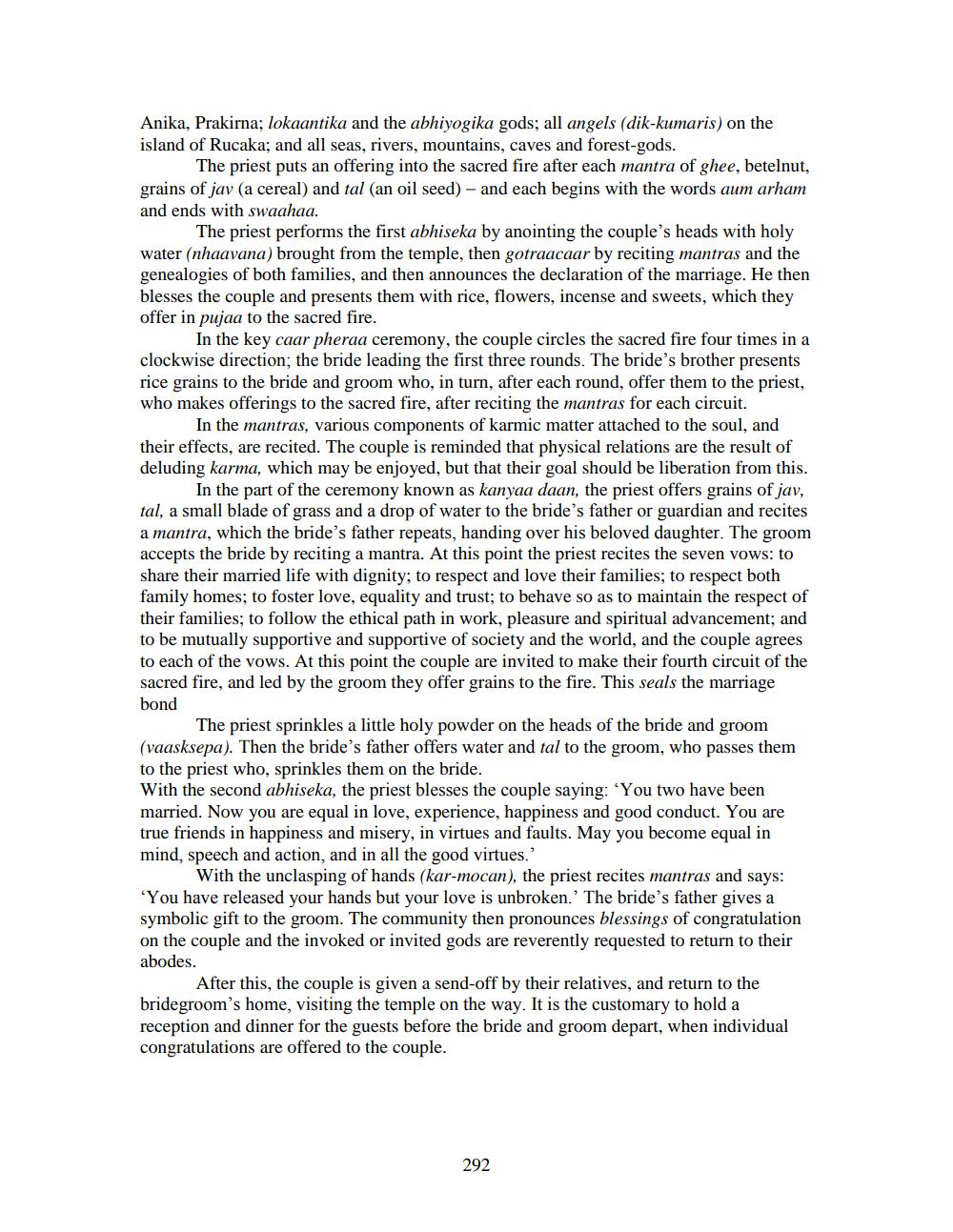________________
Anika, Prakirna; lokaantika and the abhiyogika gods; all angels (dik-kumaris) on the island of Rucaka; and all seas, rivers, mountains, caves and forest-gods.
The priest puts an offering into the sacred fire after each mantra of ghee, betelnut, grains of jav (a cereal) and tal (an oil seed) - and each begins with the words aum arham and ends with swaahaa.
The priest performs the first abhiseka by anointing the couple's heads with holy water (nhaavana) brought from the temple, then gotraacaar by reciting mantras and the genealogies of both families, and then announces the declaration of the marriage. He then blesses the couple and presents them with rice, flowers, incense and sweets, which they offer in pujaa to the sacred fire.
In the key caar pheraa ceremony, the couple circles the sacred fire four times in a clockwise direction; the bride leading the first three rounds. The bride's brother presents rice grains to the bride and groom who, in turn, after each round, offer them to the priest, who makes offerings to the sacred fire, after reciting the mantras for each circuit.
In the mantras, various components of karmic matter attached to the soul, and their effects, are recited. The couple is reminded that physical relations are the result of deluding karma, which may be enjoyed, but that their goal should be liberation from this.
In the part of the ceremony known as kanyaa daan, the priest offers grains of jav, tal, a small blade of grass and a drop of water to the bride's father or guardian and recites a mantra, which the bride's father repeats, handing over his beloved daughter. The groom accepts the bride by reciting a mantra. At this point the priest recites the seven vows: to share their married life with dignity; to respect and love their families; to respect both family homes; to foster love, equality and trust; to behave so as to maintain the respect of their families; to follow the ethical path in work, pleasure and spiritual advancement; and to be mutually supportive and supportive of society and the world, and the couple agrees to each of the vows. At this point the couple are invited to make their fourth circuit of the sacred fire, and led by the groom they offer grains to the fire. This seals the marriage bond
The priest sprinkles a little holy powder on the heads of the bride and groom (vaasksepa). Then the bride's father offers water and tal to the groom, who passes them to the priest who, sprinkles them on the bride. With the second abhiseka, the priest blesses the couple saying: 'You two have been married. Now you are equal in love, experience, happiness and good conduct. You are true friends in happiness and misery, in virtues and faults. May you become equal in mind, speech and action, and in all the good virtues.'
With the unclasping of hands (kar-mocan), the priest recites mantras and says: 'You have released your hands but your love is unbroken.' The bride's father gives a symbolic gift to the groom. The community then pronounces blessings of congratulation on the couple and the invoked or invited gods are reverently requested to return to their abodes.
After this, the couple is given a send-off by their relatives, and return to the bridegroom's home, visiting the temple on the way. It is the customary to hold a reception and dinner for the guests before the bride and groom depart, when individual congratulations are offered to the couple.
292




